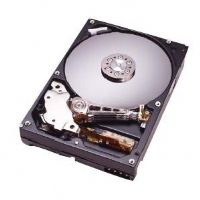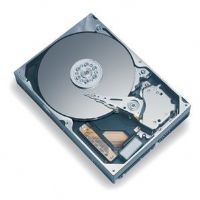Cheap Hard Drives

Hitachi 60GB EIDE HD 7200/2MB/ATA-100
Hard drives or hard disks are the main place for storing information on your computer. Getting cheap hard drives is quite easy as hard disks have not had any major changes in a few years.
Hard drives are one area where you can afford to put in a little extra money and it will pay well. Faster hard drives help to increase computer speed even more than a faster processor.
Physically, a hard drive is a whole lot of plates placed on top of each other inside a sealed case. These plates can have information written to them magnetically by a little arm (actually a set of arms) that will read or write the information.
When you install a new program on the computer, it gets stored on the hard disk. When you write a new document or save a song on the computer, chances are it will be saved on the hard drive. It’s the main permanent place for storing information on your computer. Unlike the RAM, the hard drive retains all information after the power is turned off.

Maxtor 250GB Serial ATA HD 7200/8MB/S-ATA-150
Hard drive size
A hard drive’s size is measured in GB (GigaBytes). Most hard drives are now between 40GB and 200GB in size. These will store a massive amount of information. Even if you save lots of MP3s on your computer, you won’t need more than a 40GB. Only those who save movies to hard drive will need more, and then it would probably be better to get a CD writer or DVD writer to store that information.
With that said, here are some sizes of some files
- MP3: 1MB per minute, so about 17 hours in 1GB
- VCD video or CD music: 10MB per minute, so about 1hr40mins in 1GB
- DVD movie: up to 70MB per minute, so about 15mins in 1GB
One advantage that comes with having a larger drive is that the information is more tightly packed together. Hard drives are all the same size, so if the information is closer together, the read/write heads have to travel less distance to get to the data they need. So larger disks can often be faster.
Rotational speed
The rotational speed determines how fast information can be found on that hard disk, it is how fast those plates mentioned above can spin. They range from 5400RPM to 7200RPM in the normal range for desktops, but you can find 10000RPM too, which are quite expensive. 4200RPM is usual for laptops.
The quicker that the disk can spin, the quicker the spot with the information you need can be brought back to the read/write heads. It also means that a continuous read can be done faster if the disk is spinning the information around faster.









